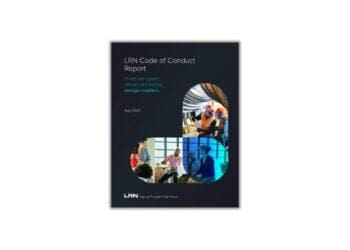Who bears the responsibility for culture? Jay Rosen explores to what extent the Chief Compliance Officer should be involved in shaping a culture of ethics and driving ethical behavior.
Let’s consider that there are multiple levels and roles for those within and outside of the corporate compliance function within an organization; they include the CCO, a compliance practitioner and the compliance function itself. What is the role of the corporate compliance function itself in strengthening the ethical culture of an organization?
It all begins with the response to a simple question: “Who is responsible for culture in an organization?” Within the C-Suite level, you might get a response that the CEO, head of HR or perhaps the general counsel is responsible.
These disparate responses underscore the uncertainty of who really bears the responsibility for culture, although intuitively, most employees understand that everyone is responsible for culture. The point is, you must look at the operations of a company through the prism of whether or not it is consistent with the company’s core values.
The duty most often falls to the CCO, meaning the CCO and the entire compliance function need to be able to coordinate the various inputs and support mechanisms that guide employee behavior.
Ultimately, the CCO is responsible for anything relating to the code of conduct and employees’ compliance with that code. The CCO is often the face of the ethics program for the company – kind of the spokesperson for the company who helps to drive behavior.
It is important for the CCO to be proactive in the role of shaping ethical culture, separate and apart from the CCO role in investigations, root cause analysis or ongoing monitoring. The CCO should work to eliminate barriers to aid in driving business success rather than being perceived as the “Department of No.” The CCO can work to coordinate all of the activities relating to building culture in an organization.
Here are a couple of examples:
In hiring and recruiting, obviously, the nuts and bolts of the process is run through HR, but the CCO can create a culture wherein the organization would only hire the right type of people as employees. These hires would have an attitude and core values that are consistent with your company.
A CCO can work to make sure that candidates understand the organization’s position with regard to fraud and other misconduct and that this is incorporated into the interview process. Once a new employee is hired, the onboarding and training begins.
While HR certainly has a leadership role in those areas, a CCO or corporate compliance function should also maintain a lead role to make sure the new employees understand their responsibilities in these critical areas. Further, it is a serious lapse if the compliance function does not make clear that the company is quite serious about its code of conduct, employees following it and their not violating it going forward.
When managing upward, the CCO has an equally critical role. It is a clear best practice for the CCO to have unfettered access to and to provide information to the board regarding the compliance and ethics posture at the company, specifically including the culture.
This task is much more difficult without the leadership and the support of the board. The board’s role is to provide leadership. This is complementary to the CCO’s role of ensuring that the board is currently informed about the ground truth of the company’s ethical culture and decision-making.
So, what are the warning signs of an unethical culture? They can be a wide variety of behaviors and actions – things like disrespectful attitudes, favoritism or nepotism in promotions or bonuses, low employee morale, lack of teamwork, a large number of anonymous whistleblower complaints (which could reflect a fear of speaking up) and employees who report being uncomfortable to talk to their supervisors and are afraid of retaliation. These are the kinds of things a CCO needs to be on top of and communicate to the CEO and the board – both the condition and the recommended solutions.
It is up to the compliance professional in the organization to have a good understanding of what is going on in the company and to communicate any warning signs to the CCO, CEO and the board.
And it’s up to the CCO to understand and have his/her finger on what the culture is, where the challenges are and what needs to be done to continually strengthen the culture.
Please join me next week when will be explore how a company can begin to assess its own culture.
In case you missed the earlier installments of this ongoing series, please see the links below.
Everything You Always Wanted to Know About Monitors But Were Afraid to Ask
Part 1, Part 2, Part 3, Part 4 and Part 5
Potential Issues in Corporate Monitorships
Part 1, Part 2, Part 3, Part 4 and Part 5
Suspension and Debarment in Monitoring
Part 1, Part 2, Part 3, Part 4 and Part 5
Monitoring in the Health Care Sector
Part 1, Part 2, Part 3, Part 4 and Part 5










